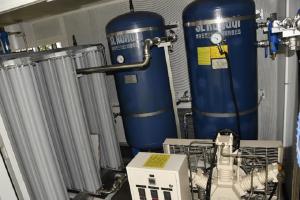Equatorial Guinea inaugurates its first public oxygen plant
Bata – Juan de Dios, a nurse in the emergency unit of the hospital in Bata, a port city in Equatorial Guinea, still remembers the frequent calls for help that echoed through the corridors: “There’s no oxygen!” “It was a race against time to procure and deliver the oxygen on time. On account of its high cost, the hospital was forced to charge families, even low-income ones, for its use. It was terrifying not knowing if we could save a life because of all this.”
He reflects on the inauguration of the oxygen plant as a real turning point: “I remember that day like it was yesterday. It was a huge relief to finally have all the oxygen we needed on site and at a lower cost.”
On 9 May 2024, Equatorial Guinea, with the support of World Health Organization (WHO), inaugurated its first medical oxygen production plant at the Bata Regional Hospital. The facility provides a reliable, affordable and accessible supply, addressing critical gaps highlighted during the COVID-19 pandemic. Previously, only five oxygen units were available, all installed in high-cost private hospitals. This milestone marks significant progress towards universal health coverage (UHC) in Equatorial Guinea.
Eleuteria, who cares for her sister who suffers from a chronic respiratory condition, immediately noticed the impact of the new plant. "When my sister was admitted to the emergency room, I was very worried because I didn't have enough money. But this time, I was pleasantly surprised to pay only CFAF 5000, seven times less than usual," says Eleuteria. "Thanks to this oxygen, my sister recovered, and we were able to return home, without great expense as in the past."
In the African Region, the high cost of oxygen makes it unaffordable for most public health facilities. Supply is also hampered by the incompatibility of cylinders and inadequate safety protocols. Logistical challenges due to oxygen’s explosive nature of oxygen, extend delivery times to four to six weeks, which is untenable delay for patients in critical situations.
Since 2021, WHO has been implementing a regional strategy to enhance medical oxygen capacity across the African Region, by installing and rehabilitating 295 production units. Additionally, it has also introduced servicing and maintenance protocols, along with an instruction tool, to help countries optimize oxygen management and reduce associated costs.
“The new plant covers all our needs, with six to seven cylinders a day, without any financial impact on the hospital or patients," explains Dr Manuel Eyene Bacale Ayeto, head of a hospital that obtains its supplies from the Bata unit. “One of the big changes is that we no longer have to turn patients away, no matter where they come from. We can now take care of everyone without having to transfer them to private hospitals due to lack of oxygen. It is now administered without any trade-off.”
The new plant uses pressure swing adsorption (PSA) technology to produce medical-grade oxygen. With a capacity of around 24 cylinders per day, this installation not only meets the needs of the Bata Regional Hospital, but also support the island part of the country in the event of shortages.
WHO played a crucial role in establishing the plant, training staff, and ensuring its sustainability. The facility includes spare parts for minor repairs over the next two to three years and has a maintenance contract in place to ensure continued functionality.
“We formed a team of three experts to produce a user's manual for the Bata Hospital team and management, to ensure that the plant remains fully operational for years to come,” explains Dr George Ameh, WHO Representative in Equatorial Guinea. “This project embodies a long-term vision in which the availability of oxygen is no longer a luxury, but guaranteed for all those who need it.”
WHO has bolstered the facility with 50 additional oxygen cylinders from the Dakar hub, ensuring a continuous supply. This support is crucial for Equatorial Guinea’s mainland region, home to 80% of the population, while also providing backup for the island areas.
“Now we have oxygen at our fingertips,” concludes Juan de Dios. “It's a transformation that has changed our lives and those of our patients.”
